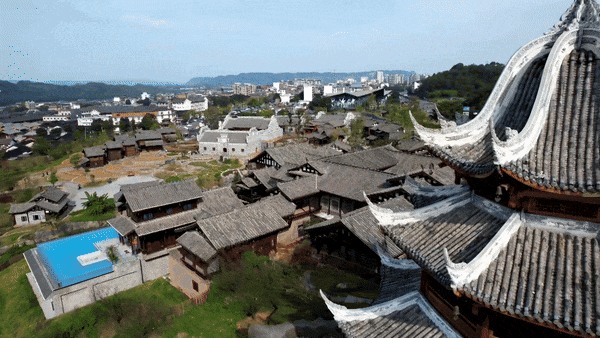
During the Chinese People’s War of Resistance Against Japanese Aggression, the small, remote town of Lizhuang in Yibin, Sichuan offered shelter to over ten thousand intellectuals. As war spread across China, these scholars arrived by the Yangtze River, carrying boxes of books. They hoped to protect China’s cultural and scientific knowledge. Some came from famous institutions like Tongji University, including well-known figures such as Lin Huiyin, Liang Sicheng, and Liang Siyong.
More than eighty years ago, Liang Siyong lived in Lizhuang with his young daughter. A local man named Luo Nangai offered them his own house when he saw that Liang was in poor health. He even brought them food after moving away. Luo also let Tongji University use his family’s ancestral hall for classes and housing. When asked why they helped, his grandchild Luo Yaxin said simply: “For our country, everyone gives what they can — some with their money, some with their strength.”
In the local museum, a drawing of borscht (罗宋汤) by Liang Sicheng shows the hope scholars held during hard times. Here, Liang and others did important research on Chinese architecture. They also became close with young pilots who were defending China. Many pilots died in battle, and their belongings were sent to the Liang family. Though sick, Lin Huiyin wrote: “That’s what the moment asked of you — and you gave it all.”
Those six difficult years were also a time of achievement. Tongji University added new programs, and researchers began archaeological studies in Southwest China. Experts continued their work on ancient Chinese writing. Villagers helped turn a temple into a medical classroom. Students brought electricity to the town for the first time. Through all the challenges, Chinese culture continued to grow.
原创编写 版权所有 侵权必究! 每日更新 个性化阅读 英语飙升!1.1. Lizhuang was safe enough during wars for its ______.
A strong walls
B location
C big population
D many soldiers
解析:选B。B 细节理解题。文章第一句提到李庄是“the small, remote town”,即偏僻的小镇,因此其安全性主要源于地理位置偏远。故选B。
2.2. What did Luo Nangai’s behavior show?
A He was very rich.
B He loved his country.
C He knew the scholars well.
D He wanted to be a teacher.
解析:选B。B 推理判断题。如其孙女所说,罗南陔帮助学者是“For our country”,即他的行为体现了爱国精神。故选B。
3.3. What does the underlined sentence convey?
A Sadness and loss.
B Hope and effort.
C Courage and sacrifice.
D Friendship and help.
解析:选C。C 推理判断题。前文提到,许多战斗机飞行员在抗战中牺牲,遗物被送往梁家。划线这句话是林徽因对牺牲飞行员的致敬,意为“时代需要你们付出一切,你们便全然奉献”,强调了那个特殊年代人们的勇敢和奉献精神。故选C。
4.4. What’s the last paragraph mainly about?
A Life in Lizhuang was always happy.
B Much was achieved despite difficulties.
C The town changed completely in six years.
D Only students did important work.
解析:选B。B段落大意题。最后一段首句说“Those six difficult years were also a time of achievement”,并列举了教育、研究、基建等多方面的成就,由此说明,困难时期仍取得了许多成就。故选B。
5.5. In which part of the magazine can we read the passage?
A HISTORY.
B CULTURE.
C SCIENCE.
D TRAVEL.
解析:选A。A 推理判断题。本文主要介绍了四川李庄镇在抗日战争期间所起的作用,结合选项可知,与历史方面相关。故选A。